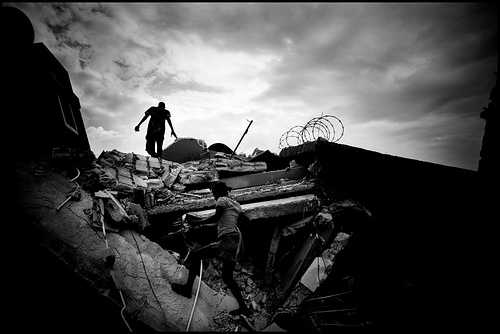Here in Southwest Florida, it’s important that families have a hurricane preparedness plan in place to make sure that if and when a storm hits, we know what to do. There are things we keep on hand that can be used in an emergency, like water, LED flashlights and canned food. But there are many other emergencies that one needs to keep in mind, no matter where you live. Alex is a mom, wife and writer who knows the importance of proper planning in order to stay safe.
If your home caught fire tonight, would everyone in your family know what to do? Have you talked to your children about testing doorknobs, choosing exits, and joining the rest of the family at a designated meet-up point? Have you actually run a fire drill?
If you haven’t, you’re not alone — according to the American Red Cross, only 26% of families have prepared a fire safety and escape plan. That leaves nearly three out of four families unprepared, which is especially tragic as children often die in fires when they do not know how to safely exit the house.
Fire safety is an important part of emergency training, but it is not the only emergency your family is likely to experience. As you prepare for 2014, take some time to think about how you and your family can develop a safe emergency practice for all of the major types of home emergencies:
- Fire
- Flood
- Tornado
- Earthquake
- Home Invasion
Let’s take a look at each of these in turn:
- Fire
Fire safety means teaching every member of your family how to avoid smoke inhalation and swiftly find a safe exit. It means selecting a safe meet-up point where all family members will gather after escaping the house. It means making sure you and your spouse, as well as all older children, know how to locate and operate your fire extinguisher. Get more fire safety tips and fun from Sparky the Fire Dog. - Flood
With most floods, people get ample warning to evacuate; however, a dangerous flash flood can quickly leave people trapped in their homes as waters rise. In that case, you need to talk to your family about flood safety, including quickly getting to higher ground and climbing onto the roof if necessary. Consider putting a first aid kit, a flashlight, and a battery-operated radio in the top floor of your home for easy access during a roof evacuation. - Tornado
With floods, you go higher; with tornadoes, you go lower, taking shelter in the lowest level of your home in a room or closet with no windows. If you live in a single-level home, take shelter in an interior closet. As with floods, it’s a good idea to have a first aid kit, a flashlight, and a battery-operated radio at hand; consider storing these items in your basement, even if you already have similar items stored in your attic. - Earthquake
My family lives in Austin, Texas, which is not known for earthquakes — but that doesn’t mean that we haven’t taken the time to develop an earthquake safety plan. Contrary to popular belief, you should not actually stand in a doorway during an earthquake; instead, you need to remember the words “Drop, Cover, and Hold On.” Like “Stop, Drop, and Roll” for fire safety, teaching your kids that simple phrase helps keep them safe on the rare occasion that an earthquake does occur. - Home Invasion
Yes, home invasions do occur — and more often than you’d think. According to ADT Austin, 7,042 burglaries occur every day in my city alone. You need a good home security system to protect your family, and you also need a plan for what to do when the alarm goes off. No, you should not go downstairs and attempt to attack or scare away the invader. Do not be the hero. Instead, barricade yourself in your room and call the police. In many cases, a home security system also notifies the police when the alarm is breached.
If you teach your family about what to do in the case of these five major home emergencies, you’ll be well prepared to handle nearly emergency that is thrown at you. Remember to practice your disaster plans at least once a year, including climbing out the window or barricading your bedroom door. The more you practice, the better prepared you are when a real emergency happens.
What safety tips do you use and preach to your family?





Trackbacks/Pingbacks